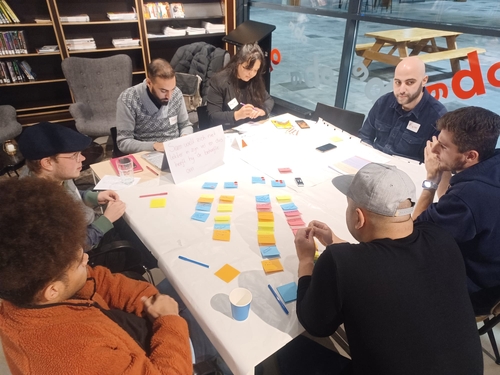Results Student and Society in Dialogue about Spaces for Mental Strength, December 2022
Part of
Keywords
In today's society, the mental health of various individuals is under pressure. Depression,burnout and loneliness are becoming more common and the pandemic has not made thingseasier. The municipality of Amsterdam is increasingly connecting public spaces in relationto the health of its residents, but what do residents of Amsterdam need to makethemselves mentally resilient and thus stay healthy?
Background
VU master's students organized focus groups in December 2022 in OBAs in various districts of Amsterdam: New West, East, West, North and Southeast.
Focus group results
In the focus groups, several spaces were identified that participants associated with strengthening or
improving their mental health. For example, cultural spaces were discussed for development and
relaxation, sports fields and other locations for exercise and unwinding, and locations that provide
space for social interaction. In general, the place itself did not appear to be the most important
factor, as long as certain basic needs can be met: exercise, social interaction and cognitive
development or self-reflection. According to participants, accessible places such as parks and
community centers meet these requirements. Interestingly, it is these spaces that are seen by
participants as being less available due to a busy, changing city: spaces to gather are strictly
regulated, there are fewer public spaces and going for a coffee somewhere else can quickly become
very expensive.
Recommendations for future research
Based on the input of the participants, the students have formulated a number of recommendations.
Firstly, attention must be paid to public spaces that meet the aforementioned criteria. These
locations must be both indoors and outdoors and the focus will have to be on accessibility and
affordability. It was also indicated in one of the focus groups that we should use what is already
available, such as local initiatives and communication between neighborhood residents. Local
residents must be given a role in the development of these places and be continuously involved in
the research. For example, a neighborhood resident can be appointed as a facilitator to gain insight
into which locations are currently available, what can or should change and how residents can
contribute to this.
Participant experiences
Many participants experienced the conversations as very instructive and gained many new insights
from each other. The sessions had a positive and confidential atmosphere where everyone felt
comfortable sharing. In addition, a frequently recurring comment from participants and students was
the lack of local residents, which somewhat detracted from the diversity at the table: "It was a
meeting in which great ideas were created. It is a pity that the voice of the residents was
underrepresented."

Image credits
Icon image: Bijeenkomst WmdW - Nieuw-West | Dec. 2022.jpeg